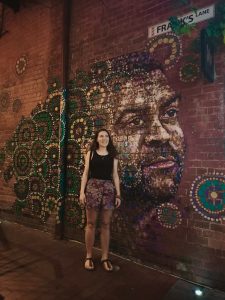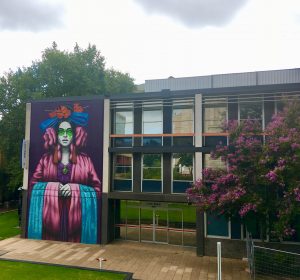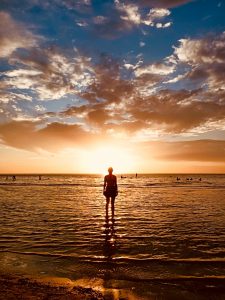I was elated to hear that I had been chosen by the SU International Office to attend a Summer School course at the University of Adelaide. Travel presents a wonderful opportunity to learn from other cultures and develop one’s perspective of the world while having plenty of fun along the way, so I knew that my month in Australia would be a memorable experience.

Pre-departure
While it is easy to become preoccupied with impending exams before your departure, early preparation is essential for a stress-free application process. Flights tend to be cheaper if booked further in advance, and it is worth trying to find the best deal, as getting to Australia is quite pricey. Summer School students who will be studying for less than three months need only apply for an ordinary tourist visa, through the VFS Global Agency on Long Street in Cape Town. While applicants are encouraged to upload their application online on the Australian Home Affairs website, I would recommend rather submitting a paper application in person at the VFS office, as this enables you to choose the time and date of your appointment on the agency website, and have your biometrics taken during the appointment. If you apply through Home Affairs, you are given a pre-determined appointment time that might not suit your exam schedule! The agency is extremely busy, so book your appointment as soon as possible, provided that you have sufficient time to compile all of the required documents. While it is bound to be a bit of a mission, I found the visa application process to be straight-forward. It is an electronic visa, so you can keep your passport after the appointment, and my visa was granted within two weeks. Everyone at the International Office is very helpful; don’t hesitate to ask for assistance if you need it.
Be aware that the Adelaide term dates differ significantly to Stellenbosch, so most of the Summer School courses run when the Stellies semester has already begun. Make arrangements to miss a couple of weeks of varsity in Stellenbosch or be careful to choose one of the earliest courses. Stellenbosch University is ahead of the game in more than one way, particularly when it comes to admin and setting course dates – Adelaide University only release the final Summer School course dates in the first week of December, by which time you are likely to have booked your flights and accommodation. Make sure that you book flexi-flights which can be changed, in case the dates of your course are altered. Remember to pack a travel plug adapter as well as a two-prong adapter to charge electronics, and make sure you have your student card with you, to qualify for the concession prices on the excellent public transport systems.
I am fortunate to have old school friends living in Adelaide, so I chose to arrive a couple of weeks early to spend time with them and thoroughly explore the city and surrounding areas. Even if you don’t know anyone at your destination, I would recommend arriving early to make the most out of your journey before academics begin, and to recover from jetlag. The eight-hour time difference is no joke!

Time in Adelaide
As we descended towards Adelaide airport, the pilot commented on the spectacular view of the South Australian coastline. Gazing out of the window at the beauty of the fiery orange sunset, I couldn’t help but think of the rampant bush fires and the devastation that the country is experiencing. Fortunately, the city itself has thus far been safe, but in the surrounding hills the ground is black and charred. Something that struck me during my stay was the resilience of many people during this difficult time and their willingness to band together to support those who have lost everything to the fires, and those who are risking everything to fight the fires.
Adelaide is a friendly, cosmopolitan city that has much to offer. During my time there, I went hiking in Waterfall Gulley, strolled along the River Torrens, and scaled Mount Lofty. I wandered the Botanic Gardens and snoozed on park lawns, looking up at the patterns that the branches of the Honey Locust trees made against the sky. I explored the outer-lying country settlements of the Barossa Valley, which is only a bus ride away. I visited the Whispering Wall and endlessly browsed second-hand bookshops. Adelaide boasts pristine, calm beaches which are well worth visiting, as long as you are on the look-out for jelly fish and sunburn! Watching the sunset from Semaphore Beach was one of the highlights of my stay. The Central Market in the city is an eclectic meeting place of cultures, as well as a good spot for student-friendly meal or grocery prices. I experienced an authentically Australian evening with newly made local friends and enjoyed the live music of buskers in the streets.
The Summer School course which I attended was Advanced Australian Constitutional Law. It allowed me to expand my international legal perspective and to conduct a comparative analysis between jurisdictions. The seminars were presented by several renowned professors, as well as some guest lecturers who are experts in their respective fields. It was interesting to hear from High Court barristers who are involved in current cases which will have significant implications for Australia’s implied freedom of speech, and to learn from former judges who witnessed the country’s Constitutional crisis which spanned the previous century. The course was very participation-orientated, and it was structured to facilitate a great deal of discussion and debate amongst the students. As well as writing three assigned essays, I was required to choose a topic for a research thesis, and to present my research proposal to the rest of the class. I opted to discuss the lack of an environmental protection clause in the Australian Constitution, and to explore to what extent this lack of direct environmental protection fails to align with contemporary Australian values. Approaching this research from my home Constitutional perspective provided interesting insight. The South African Constitution is relatively new, and it entitles all people to a protected environment which is not harmful to their well-being. In contrast, the Australian Constitution was drafted long ago in 1901. Thus, many important rights are missing from its provisions and have to be indirectly implied by the courts. Attending the course has augmented my understanding of the law, both in my home legal system and in the international sphere.
Returning to South Africa
I have traveled extensively in my life, yet touching down on South African soil never fails to instill in me a sense of immense gratitude to be returning to the land I call home. However, one can easily become disillusioned with the state of our country. Driving back to Stellenbosch, I am once again confronted with despicable inequality. It is undeniable that South Africa is rife with issues which desperately need to be addressed.
Upon reflection, spending time with people from different walks of life in Australia has reaffirmed for me the knowledge that the grass really isn’t always greener on the other side. All nations face difficulties. South Africa’s difficulties and past injustices are extreme; they will never disappear. I hope that this, rather than driving people away, will make people want to stay and be a part of progress. I met someone on the aeroplane who was returning home to South Africa for the first time in nine years. When Table Mountain appeared in the distance, he had tears in his eyes.
Should the opportunity present itself, I look forward to continuing to explore the world. But I know that South Africa will always be the place that I call home. Our natural environment is exquisite and diverse, our people are lively and resilient, and our culture is a wonderfully dynamic, growing amalgamation of vibrancy. South Africa has soul.


